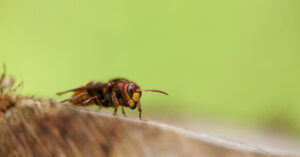 Bees and hornets may look similar at first glance. But they have some clear differences if you know what to look for. They have distinct physical characteristics, nesting locations, diets, aggression levels, and sting severity.
Bees and hornets may look similar at first glance. But they have some clear differences if you know what to look for. They have distinct physical characteristics, nesting locations, diets, aggression levels, and sting severity.
How to Identify a Carpenter Bee Hole
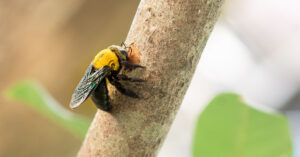 It’s summertime, and suddenly there are a few mysterious holes in your siding, deck, or other wood areas of your home. You prod one of the holes and a little sawdust comes out. Then you see it… a dark, fuzzy bee that has been droning around the yard enters the hole. “What in the world is going on here?” you may wonder.
It’s summertime, and suddenly there are a few mysterious holes in your siding, deck, or other wood areas of your home. You prod one of the holes and a little sawdust comes out. Then you see it… a dark, fuzzy bee that has been droning around the yard enters the hole. “What in the world is going on here?” you may wonder.
If this has happened to you, there’s a good chance carpenter bees have taken up residence on your property. Carpenter bees are a member of the bee species that drill holes in wood to build their nests. Female carpenter bees use their powerful mandibles to bore into wood in a circular motion. This creates a round hole that over time is expanded into a maze of channels and chambers. These tunnels eventually weaken the wood and damage the integrity of the structure in which they’re built.
What to Know About Lyme Disease on Long Island
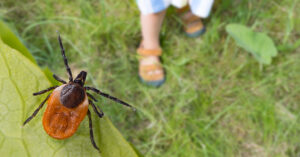 Tick season has arrived on Long Island, and with it comes the risk of contracting a tick-borne illness. The most common – and possibly most dreaded – of these is Lyme disease, a bacterial infection transmitted through tick bites. Characterized by flu-like symptoms and a distinctive bullseye rash, Lyme disease can cause debilitating long-term health effects.
Tick season has arrived on Long Island, and with it comes the risk of contracting a tick-borne illness. The most common – and possibly most dreaded – of these is Lyme disease, a bacterial infection transmitted through tick bites. Characterized by flu-like symptoms and a distinctive bullseye rash, Lyme disease can cause debilitating long-term health effects.
Is There Lyme Disease on Long Island?
A Columbia University study estimates that 56 percent of ticks on Long Island are carrying Lyme disease. The Suffolk County Department of Health Services believes those percentages may be even higher in eastern Suffolk County, particularly along the north and south shores where Lyme-carrying black legged ticks (also known as deer ticks) are plentiful.
How Common Is Lyme Disease in NY?
Because many people with mild cases of Lyme disease are either unaware that they have been exposed or don’t seek medical treatment, it’s difficult to get exact figures of how prevalent Lyme disease is in the state. Suffolk County alone reports approximately 500 confirmed cases each year. Estimates of unreported cases are significantly higher.
Regardless, if you have been bitten by a tick then the chances are greater than 50/50 that it carries Lyme. After any tick bite, it’s important to identify the species that bit you and to watch for signs you may have been exposed.
How Serious Is Lyme Disease?
Lyme disease infections vary in severity. If treated early, they are typically cured with a two-to-four-week course of oral antibiotics. However, some individuals experience symptoms that linger for months after the initial infection.
Post-treatment Lyme disease syndrome is when pain, fatigue, and brain fog last for six months or more after treatment for a Lyme disease infection. The consequences may be even more serious for those whose initial infection goes untreated. These individuals may develop late-stage Lyme disease that leads to permanent neurological damage and lifelong health issues.
What Are the Early Signs of Lyme Disease?
Early signs of Lyme disease typically include swollen lymph nodes, fatigue, headache, joint and muscle pain, fever and chills, and a red bump at the site of the bite. Many people develop a bullseye-shaped rash around the bite.
What Are the Stages of Lyme Disease?
Lyme disease has three stages:
- Stage one is localized Lyme disease, where the bacteria remain near the bite and hasn’t spread throughout the body.
- Stage two is called early disseminated Lyme disease, when bacteria has begun to spread.
- Stage three, or late disseminated Lyme disease, occurs when the bacteria has spread throughout the body.
Most cases of stage one Lyme disease resolve within weeks when treated promptly with antibiotics. Outcomes become progressively worse further into stage two or three, and may take months or years to clear, often leaving permanent damage. This is why prompt, early intervention is important.
If you have any reason to believe you have been exposed to Lyme disease, consult your doctor immediately.
Twin Forks Pest Control® Offers Comprehensive Pest Management
Twin Forks Pest Control® is your Long Island pest management expert, keeping your home and property pest free since 1997. We offer comprehensive pest management packages to keep your home and property pest-free year-round. Call us today for a free estimate. We look forward to hearing from you!
Can Pets Protect Your Garden from Pests?
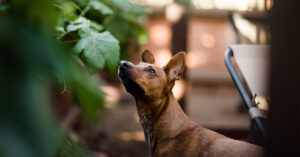 In honor of National Pet Day, April 11, let’s unpack a frequently asked question: Can pets protect your garden from pests?
In honor of National Pet Day, April 11, let’s unpack a frequently asked question: Can pets protect your garden from pests?
The assumption is that outdoor cats will kill rodents and large bugs, and dogs will chase off larger pests like squirrels and raccoons. The actuality is a bit different: your pets actually may attract pests looking for a meal or a host, and those pests can do them harm.
Can Garden Pests Harm Your Dog?
There are many garden pests that can harm dogs, cats, and other domestic animals. Pest threats include insect bites, rodent bites, and pest-vectored diseases.
Fleas, ticks, and mosquitoes are the worst offenders. Fleas can transmit babesiosis and tapeworms… as well as cause anemia and contact dermatitis. Ticks are carriers of Lyme disease, bartonellosis, ehrlichiosis, Rocky Mountain Spotted Fever, hepatozoonosis, and babesiosis. Mosquitoes can infect dogs and cats with West Nile virus (although the symptoms are typically mild). The bigger mosquito threat comes from heartworm infections – which can be fatal if not treated.
Among other yard pests that can infest or sicken your pets are stinkbugs, mites, worms, and bottle flies. Don’t forget that rodents (such as rats, mice, and squirrels) can transmit diseases through their bites, urine, feces, and carcasses.
How Do You Get Rid of Pests without Harming Pets?
The first step toward keeping your pet safe is to avoid attracting pests in the first place. Be sure your yard is free of debris that could provide food or cover for pests.
Indoors, keep your home clear of food and water sources that can entice bugs and rodents. Pay close attention to your pets’ food dishes, clean them often and refrain from leaving food in them when your pet has finished eating.
Avoid forms of pest control that can sicken your pet. While domestic animals like dogs and cats are rarely attracted to poisons intended for insects and rodents… adventurous pets may chew or consume them anyway. They also may become ill (or worse) if they encounter a rodent that has eaten poison.
If you use pest control products commonly available at retail outlets, do your research to ensure they are pet safe. Just because you can buy garden control products at grocery and home improvement stores, doesn’t mean they can’t harm your pet. Even something as seemingly natural and benign as citronella candles can be harmful or fatal to your pets.
The best way to keep your pets safe and your home pest-free is to use the services of a qualified professional pest control company like Twin Forks®. We are trained in the safe use of pesticides and are committed to the well-being of your entire family, including your pets!
How Long Should Pets Stay Away from Pest Control?
Generally speaking, you should ensure pets stay away at least until the pest treatment is dry. Timing will depend on the product used, as well as environmental factors like humidity and rainfall. If you use a pest control product, read the instructions thoroughly and if it doesn’t state how long pets should avoid contact then don’t use it.
If you’re concerned about your pets’ safety, a professional pest control company will give you detailed instructions on how long to wait before allowing your pets to come in contact with treated areas of your home or yard.
Twin Fork Pest Control® Treats Your Pets Like Family
At Twin Forks Pest Control®, we understand that your pets are members of the family, and their safety is a priority. We eliminate dangerous pest threats from your home and yard, using the safest products available. We will inform you clearly, with specific instructions, if there is a need to temporarily exclude your pets from a treated area. For pet-safe pest removal, call us today for a free estimate.
Impact of Climate Change on Rodents
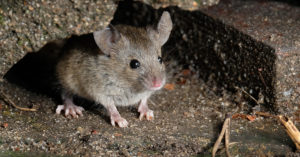 In 2012, Superstorm Sandy was a wake-up call for Long Island residents. We learned that climate change – once dismissed as a problem mainly for those in hotter climates – might be knocking on our door.
In 2012, Superstorm Sandy was a wake-up call for Long Island residents. We learned that climate change – once dismissed as a problem mainly for those in hotter climates – might be knocking on our door.
In the decade since then… we have seen warmer, shorter winters and a warming, rising Long Island Sound. Climate change is already having an effect on Long Island’s ecosystems, and it’s affecting pest populations as well. Even rodents are feeling the effects of warmer winters – and changes to their biology and habits will ultimately impact us.
Are Squirrels Territorial?
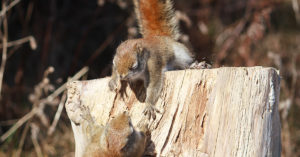 With their bushy tails and the way they seem to dash about playfully (they actually run in erratic patterns to avoid predators), squirrels look adorable. Underneath that playful exterior, could squirrels be hiding territorial or aggressive tendencies? As with most wild creatures, it’s a bit complicated.
With their bushy tails and the way they seem to dash about playfully (they actually run in erratic patterns to avoid predators), squirrels look adorable. Underneath that playful exterior, could squirrels be hiding territorial or aggressive tendencies? As with most wild creatures, it’s a bit complicated.
Certain species, such as the American red squirrel and the northern flying squirrel, are very territorial. Both types of squirrels keep interlopers away and use their urine to mark their territory.
Also, remember that female squirrels, regardless of their species, can behave territorial or aggressively when protecting their young. That’s also true of most females of any species, squirrel or not.
Squirrel communication is also rather complicated. They can aggressively chitter and wag their tails to send a “stay away” warning signal. Some untrained observers can also mistake their more normal chittering vocalizations as a warning.
Are Eastern Gray Squirrels Territorial?
Remember when we said, “it’s complicated”? Eastern gray squirrels are the perfect example because someone watching their activities and behavior could easily think they’re territorial, but they actually aren’t. The confusion is because eastern gray squirrels have hierarchies and use dominance to establish and maintain their place in that hierarchy. As such, they’ll chase each other, not to drive a squirrel away from their territory but to exert its dominance over the other one. It can look the same to those who aren’t trained wildlife experts.
Other traits that lead people to think eastern gray squirrels are territorial involve courtship and training. When trying to attract mates in the spring, male eastern gray squirrels will chase females, but in a far less aggressive manner than they do in the dominance games. It’s a courtship ritual they engage in to evaluate each other as mates. Young squirrels, much like puppies and kittens, will chase and playfully “fight” each other as a way of learning how to do it for real.
Are Squirrels Aggressive to Humans?
Generally, no, squirrels aren’t dangerously aggressive to humans. However, a lot of C.W. Postgraduates can tell stories about the squirrels on campus chittering at them with attitude and body language that makes it clear they should keep their distance.
Squirrels can be aggressive to each other under certain circumstances, regardless of the species. For example, wildlife experts have found that male squirrels will kill young squirrels belonging to their rivals and not just in times when food is scarce. They’ll also do it when food is abundant.
Are Squirrels Loners?
Whether a squirrel is a loner depends upon several factors. Certain types of squirrels live in extended groups or colonies called a dray or a scurry. Other types, such as tree squirrels, will live alone or in small family groups. However, even squirrels that are natural loners will come together in extreme weather to huddle together to stay warm and survive.
Let Twin Forks Pest Control® Solve Your Squirrel Problems
Squirrels are cute to watch from a distance but difficult to remove if they’ve gotten inside your attic, chimney, or walls. At Twin Forks Pest Control®, we have more than 20 years of experience humanely removing squirrels. If you think squirrels have gotten into your home, call us today for a free estimate.
- « Previous Page
- 1
- 2
- 3
- 4
- 5
- 6
- …
- 8
- Next Page »


